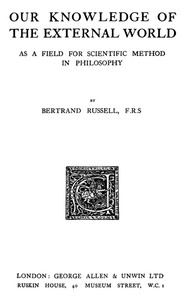Our Knowledge of the External World as a Field for Scientific Method in…
"Our Knowledge of the External World as a Field for Scientific Method in Philosophy" by Bertrand Russell is a philosophical treatise written in the early 20th century. The work explores the limitations and potentials of the logical-analytic method in philosophy, aiming to ground philosophical inquiry in scientific principles and objective knowledge. Russell's central focus is on the relation between sensory data and the concepts in mathematical physics. The opening of the text
introduces the context for Russell's lectures, where he seeks to establish the importance of a rigorous scientific method in philosophical practice. He evaluates the historical claims made by philosophers about the nature of reality and knowledge, critiquing them for their often excessive ambitions and inadequate results. By doing so, he highlights the need for philosophy to evolve alongside the advances in scientific understanding, employing logic and analysis to tackle complex problems that were previously considered unsolvable. (This is an automatically generated summary.)
Read or download for free
| How to read | Url | Size | |||
|---|---|---|---|---|---|
| Read now! | https://www.gutenberg.org/ebooks/37090.html.images | 509 kB | |||
| EPUB3 (E-readers incl. Send-to-Kindle) | https://www.gutenberg.org/ebooks/37090.epub3.images | 243 kB | |||
| EPUB (older E-readers) | https://www.gutenberg.org/ebooks/37090.epub.images | 248 kB | |||
| EPUB (no images, older E-readers) | https://www.gutenberg.org/ebooks/37090.epub.noimages | 221 kB | |||
| Kindle | https://www.gutenberg.org/ebooks/37090.kf8.images | 385 kB | |||
| older Kindles | https://www.gutenberg.org/ebooks/37090.kindle.images | 334 kB | |||
| Plain Text UTF-8 | https://www.gutenberg.org/ebooks/37090.txt.utf-8 | 437 kB | |||
| Download HTML (zip) | https://www.gutenberg.org/cache/epub/37090/pg37090-h.zip | 225 kB | |||
| There may be more files related to this item. | |||||
Similar Books
About this eBook
| Author | Russell, Bertrand, 1872-1970 |
|---|---|
| Title | Our Knowledge of the External World as a Field for Scientific Method in Philosophy |
| Contents | Preface -- Current tendencies -- Logic as the essence of philosophy -- On our knowledge of the external world -- The world of physics and the world of sense -- The theory of continuity -- The problem of infinity considered historically -- The positive theory of infinity -- On the notion of cause, with applications to the free-will problem. |
| Credits |
Produced by Jana Srna and the Online Distributed Proofreading Team at www.pgdp.net |
| Reading Level | Reading ease score: 54.4 (10th to 12th grade). Somewhat difficult to read. |
| Language | English |
| LoC Class | B: Philosophy, Psychology, Religion |
| Subject | Knowledge, Theory of |
| Subject | Logical atomism |
| Category | Text |
| EBook-No. | 37090 |
| Release Date | Aug 15, 2011 |
| Most Recently Updated | Jan 8, 2021 |
| Copyright Status | Public domain in the USA. |
| Downloads | 1075 downloads in the last 30 days. |
| Project Gutenberg eBooks are always free! | |

